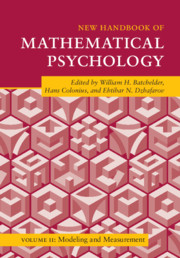
- Publisher:
- Cambridge University Press
- Online publication date:
- September 2018
- Print publication year:
- 2018
- Online ISBN:
- 9781139245906

The field of mathematical psychology began in the 1950s and includes both psychological theorizing, in which mathematics plays a key role, and applied mathematics motivated by substantive problems in psychology. Central to its success was the publication of the first Handbook of Mathematical Psychology in the 1960s. The psychological sciences have since expanded to include new areas of research, and significant advances have been made in both traditional psychological domains and in the applications of the computational sciences to psychology. Upholding the rigor of the original Handbook, the New Handbook of Mathematical Psychology reflects the current state of the field by exploring the mathematical and computational foundations of new developments over the last half-century. The second volume focuses on areas of mathematics that are used in constructing models of cognitive phenomena and decision making, and on the role of measurement in psychology.
‘This Handbook contains review articles by leaders of the field. It will be a valuable reference for all who are interested in mathematical psychology.'
Brian Skyrms - University of California, Irvine
‘This volume is the second in a series devoted to presenting a very readable, yet broad and deep, up-to-date perspective on mathematical psychology. It will be of interest to graduate students and experienced researchers who are concerned with modeling and measurement in the psychological and cognitive sciences.'
Thomas S. Wallsten - University of Maryland
'These two volumes are a valuable contribution to mathematical psychology; partly representing important summaries of special branches, partly pushing the forefront of research towards new horizons. They should be read by all working in special fields, but also by students who are striving for a general point of view. We are looking forward to the third volume.'
Reinhard Suck Source: Journal of Mathematical Psychology
 Loading metrics...
Loading metrics...
* Views captured on Cambridge Core between #date#. This data will be updated every 24 hours.
Usage data cannot currently be displayed.